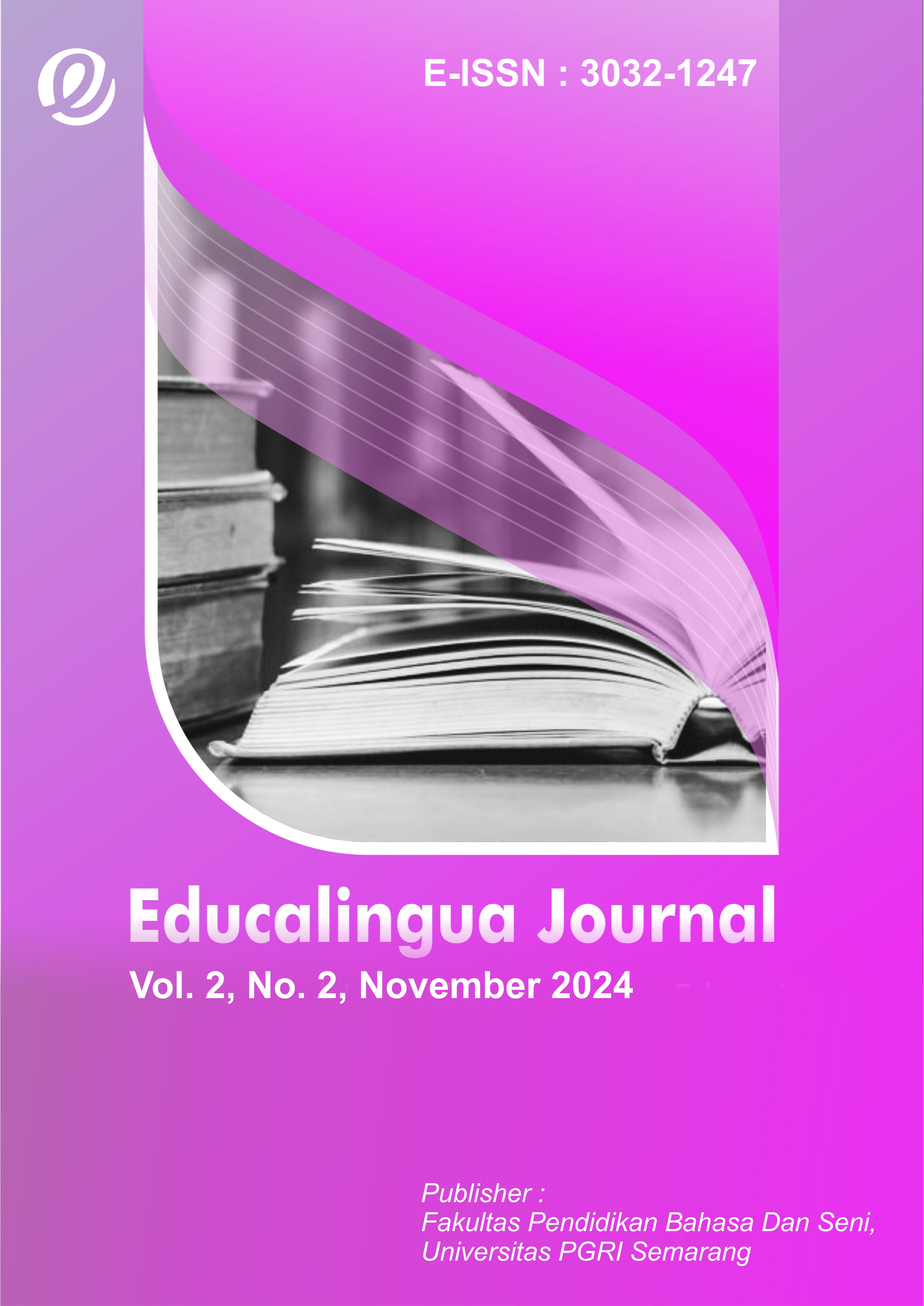The Meritorious Learning Rewards Promoted by Chat GPT in Academic Writing Classroom Contexts
DOI:
https://doi.org/10.26877/educalingua.v2i2.581Keywords:
Academic writing, Chat GPT, EFL learners, library investigation, thematic analysisAbstract
One of the most conspicuous and serious hindrances oftentimes confronted in these presently-situated academic writing learning dynamics is the constant presence of an emotionally-exhausting and anxiety-inducing learning environment in which EFL learners experience the absence of writing enjoyment. To better lessen this debilitating hurdle, second language educators are highly recommended to start activating the proper usage of artificial intelligence platforms in their regular academic writing learning enterprises. By carrying out this initiative, EFL learners will be mentally constructed upon facing the possible occurrence of taxing academic writing learning obstructions. This small-scale library investigation was initiated by the researcher to profoundly explore the potential meritorious learning rewards promoted by ChatGPT in modern academic writing classroom contexts. To achieve this major study objective, the researcher made use of a thematic analysis approach in analyzing the identical research results yielded by 20 previously-published ChatGPT scientific journals. The main purpose of embedding this research methodology is to ascertain the relevancy, applicability, and robustness of impendent research outcomes. Two major reasons underlined worldwide second language educationalists to internalize the ChatGPT tool at the onset of variegated academic writing classroom settings namely the significant reduction of writing errors and the realization of proficient academic writers.
References
References
Al-Garaady, J., & Mahyoob, M. (2023). ChatGPT's capabilities in spotting and analyzing writing errors experienced by EFL learners. Arab World English Journals, Special Issue on CALL, (9).
Bin-Hady, W. R. A., Al-Kadi, A., Hazaea, A., & Ali, J. K. M. (2023). Exploring the dimensions of ChatGPT in English language learning: a global perspective. Library Hi Tech. https://doi.org/10.1108/LHT-05-2023-0200
Campbell, M. (2019). Teaching academic writing in higher education. Education Quarterly Reviews, 2(3). 608-614.
Chawla, Y., Shimpo, F., & Sokołowski, M. M. (2022). Artificial intelligence and information management in the energy transition of India: lessons from the global IT heart. Digital Policy, Regulation and
Governance , 24(1), 17–29. https://doi.org/10.1108/DPRG-05-2021-0062
Godwin-Jones, R. (2022). Partnering with AI: Intelligent writing assistance and instructed language learning. Language Learning & Technology, 26(2), 5–24. http://doi.org/10125/73474
Han, J., & Kim, M. (n.d.). Exploring Student-ChatGPT Dialogue in EFL Writing Education. 1–15.
Han, J., Yoo, H., Myung, J., Kim, M., Lee, T. Y., Ahn, S.-Y., & Oh, A. (2023). ChEDDAR: Student-ChatGPT Dialogue in EFL Writing Education. http://arxiv.org/abs/2309.13243
Hawanti, S., & Munisa, K. (2023). AI chatbot-based learning : alleviating students ’ anxiety in english writing classroom. 7(2), 182–192.
Huang, J. (2023). Engineering ChatGPT Prompts for EFL Writing Classes. International Journal of TESOL Studies, 5, 73–79. https://doi.org/10.58304/ijts.20230405
Hwang, S. Il, Lim, J. S., Lee, R. W., Matsui, Y., Iguchi, T., Hiraki, T., & Ahn, H. (2023). Is ChatGPT a “Fire of Prometheus” for Non-Native English-Speaking Researchers in Academic Writing? Korean Journal of Radiology, 24(10), 952–959. https://doi.org/10.3348/kjr.2023.0773
Ismail, H. Y. S. (2023). Cohesion and Coherence in Essays Generated by ChatGPT: A Comparative Analysis to University Students’ Writing. CDELT Occasional Papers in the Development of English Education, 83(1), 143–165. https://doi.org/10.21608/opde.2023.325331
Ivanovska, L. (2023). ChatGPT for EFL Teachers and Students. 351–359.
Klassen, A. C., Creswell, J., Plano Clark, V. L., Smith, K. C., & Meissner, H. I. (2012). Best practices in mixed methods for quality of life research. Quality of life Research, 21, 377-380.
Ko, G. Y., Shin, D., Auh, S., Lee, Y., & Han, S. P. (2023). Learning Outside the Classroom During a Pandemic: Evidence from an Artificial Intelligence-Based Education App. Management Science, 69(6), 3616-3649.
Li, J., & Chen, C. (2023). Exploring the Use of ChatGPT in Chinese Language Classrooms. 4, 36–55.
Mahama, I., Baidoo-Anu, D., Eshun, P., Ayimbire, B., & Eggley, V. E. (2023). ChatGPT in Academic Writing: A Threat to Human Creativity and Academic Integrity? An Exploratory Study. Indonesian Journal of Innovation and Applied Sciences (IJIAS), 3(3), 228–239. https://doi.org/10.47540/ijias.v3i3.1005
Mahyoob, M., Al-Garaady, J., & Alblwi, A. (2023). A proposed framework for human-like language processing of ChatGPT in academic writing. International Journal of Emerging Technologies in Learning (iJET), 18(14).
Man, A., Tai, Y., Meyer, M., Varidel, M., Prodan, A., Vogel, M., Iorfino, F., & Krausz, R. M. (2023). Exploring the potential and limitations of ChatGPT for academic peer-reviewed writing : Addressing linguistic injustice and ethical concerns. Journal of Academic Language & Learning, 17(1), 16–30.
Meunier, F., Pikhart, M., & Klimova, B. (2022). Editorial: New perspectives of L2 acquisition related to human-computer interaction (HCI). Frontiers in Psychology, 13. https://doi.org/10.3389/fpsyg.2022.1098208
Mizumoto, A., & Eguchi, M. (2023). Exploring the potential of using an AI language model for automated essay scoring. Research Methods in Applied Linguistics, 2(2), 100050.
Mohamed Haggag, H. (2023). A Program Based on Chat Generative Pre-trained Text Transformer (ChatGPT) for Enhancing EFL Majors’ Descriptive Paragraph Writing Skills and Their English Grammar Use. English International Journal, 39(6), 1–29. https://doi.org/10.21608/mfes.2023.315599
Nguyen, T. T. H. (2023). EFL Teachers’ Perspectives toward the Use of ChatGPT in Writing Classes: A Case Study at Van Lang University. International Journal of Language Instruction, 2(3), 1–47. https://doi.org/10.54855/ijli.23231
Raheem, B. R., Anjum, F., & Ghafar, Z. N. (2023). Exploring the Profound Impact of Artificial Intelligence Applications (Quillbot, Grammarly and ChatGPT) on English Academic Writing: A Systematic Review. November. https://doi.org/10.59890/ijir.v1i10.366
Roe, J., Renandya, W. A., & Jacobs, G. M. (2023). A Review of AI-Powered Writing Tools and Their Implications for Academic Integrity in the Language Classroom. Journal of English and Applied Linguistics, 2(1). https://doi.org/10.59588/2961-3094.1035
Song, C., & Song, Y. (2023). Enhancing academic writing skills and motivation: assessing the efficacy of ChatGPT in AI-assisted language learning for EFL students. Frontiers in Psychology, 14(December), 1–14. https://doi.org/10.3389/fpsyg.2023.1260843
Xiao, Y., & Zhi, Y. (2023). An Exploratory Study of EFL Learners’ Use of ChatGPT for Language Learning Tasks: Experience and Perceptions. Languages, 8(3), 1–12. https://doi.org/10.3390/languages8030212
Yan, D. (2023). How ChatGPT’s automatic text generation impact on learners in a L2 writing practicum: an exploratory investigation. HAL Open Science, 1–39.
Yoon, S.-Y., Miszoglad, E., & Pierce, L. R. (2023). Evaluation of ChatGPT Feedback on ELL Writers’ Coherence and Cohesion. 1–24. http://arxiv.org/abs/2310.06505
Zadorozhnyy, A. (2024). ChatGPT and L2 Written Communication : A Game-Changer or Just Another Tool ? Kohnke 2023.
Zhai, N., & Ma, X. (2023). The Effectiveness of Automated Writing Evaluation on Writing Quality: A Meta-Analysis. Journal of Educational Computing Research, 61(4), 875–900. https://doi.org/10.1177/07356331221127300
Zhang, S., Yu, H., & Zhang, L. J. (2021). Understanding the sustainable growth of EFL students’ writing skills: Differences between novice writers and expert writers in their use of lexical bundles in academic writing. Sustainability (Switzerland), 13(10). https://doi.org/10.3390/su13105553








